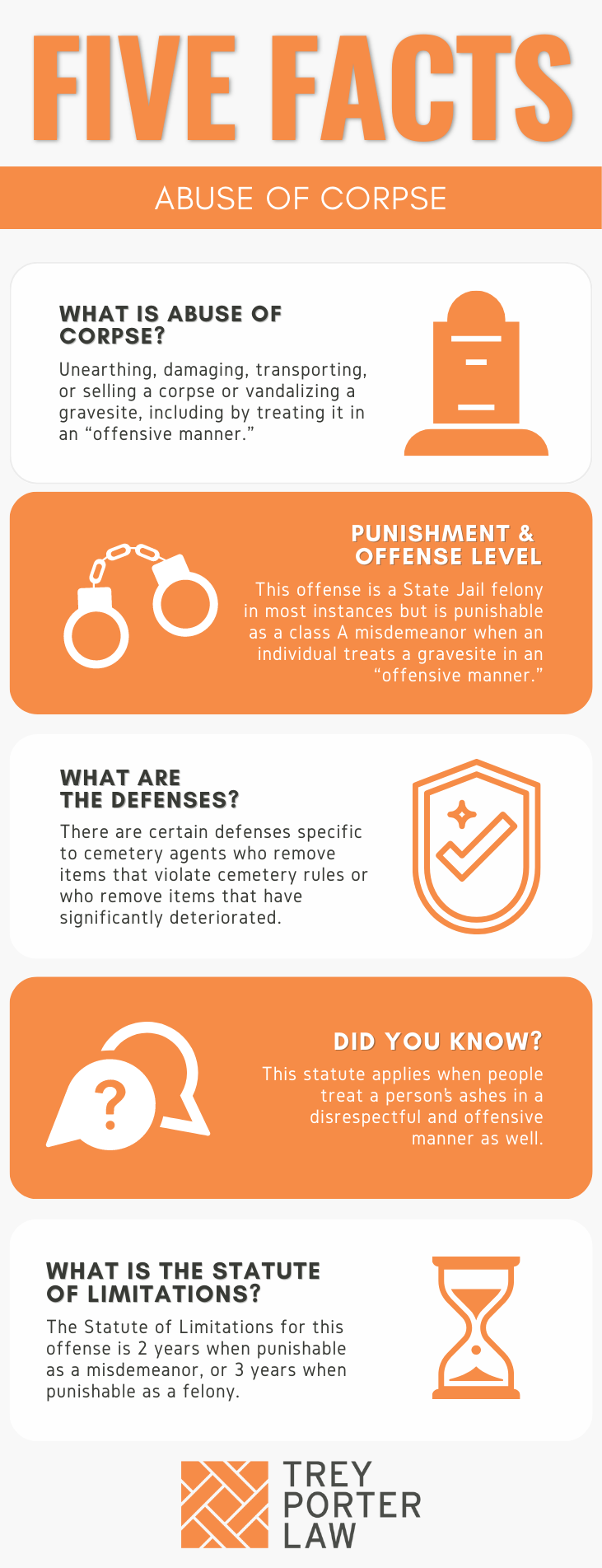WHAT IS ABUSE OF CORPSE IN TEXAS?
The Texas law against abuse of corpse prohibits unearthing, damaging, transporting, buying, selling, or concealing an illegally disinterred human corpse. Vandalizing a gravesite, or treating it in an “offensive manner,” also constitutes abuse of corpse.

WHAT IS THE ABUSE OF CORPSE LAW IN TEXAS?
Tex. Penal Code § 42.08. ABUSE OF CORPSE.
(a) A person commits an offense if the person, without legal authority, knowingly:
(1) disinters, disturbs, damages, dissects, in whole or in part, carries away, or treats in an offensive manner a human corpse;
(2) conceals a human corpse knowing it to be illegally disinterred;
(3) sells or buys a human corpse or in any way traffics in a human corpse;
(4) transmits or conveys, or procures to be transmitted or conveyed, a human corpse to a place outside the state; or
(5) vandalizes, damages, or treats in an offensive manner the space in which a human corpse has been interred or otherwise permanently laid to rest.
(b) An offense under this section is a state jail felony, except that an offense under Subsection (a)(5) is a Class A misdemeanor.
(d) If conduct constituting an offense under this section also constitutes an offense under another section of this code, the actor may be prosecuted under either section or both sections.
(e) It is a defense to prosecution under this section that the actor:
(1) as a member or agent of a cemetery organization, removed or damaged anything that had been placed in or on any portion of the organization’s cemetery in violation of the rules of the organization; or
(2) removed anything:
(A) placed in the cemetery in violation of the rules of the cemetery organization; or
(B) placed in the cemetery by or with the cemetery organization’s consent but that, in the organization’s judgment, had become wrecked, unsightly, or dilapidated.
WHAT IS THE PENALTY CLASS FOR ABUSE OF CORPSE IN TEXAS?
Abuse of corpse by vandalizing a gravesite is a Class A misdemeanor, punishable by up to one year in jail. Abuse of corpse is otherwise a state jail felony, punishable by 180 days to two years in a state jail facility.
WHAT IS THE PUNISHMENT RANGE FOR ABUSE OF CORPSE IN TEXAS?
Abuse of corpse charged as a Class A misdemeanor carries a maximum jail sentence of one year, and a maximum $4,000 fine. A person charged with abuse of corpse as a state jail felony faces between 180 days and two years in a state jail facility, and a maximum $10,000 fine.
WHAT ARE THE PENALTIES FOR ABUSE OF CORPSE IN TEXAS?
A person charged with abuse of corpse may be eligible for probation after a conviction, or deferred adjudication without a conviction. The period of community supervision for a misdemeanor may not exceed two years. If a person is charged with abuse of corpse as a state jail felony, the community supervision term may range between two and five years, with the possibility of extending supervision for up to ten years.
WHAT ARE THE DEFENSES TO ABUSE OF CORPSE IN TEXAS?
The law authorizes a defense to abuse of corpse for any agent or member of a cemetery organization who removes items from a gravesite that were either placed there in violation of the cemetery’s rules, or have become wrecked, unsightly, or dilapidated.
WHAT IS THE STATUTE OF LIMITATIONS FOR ABUSE OF CORPSE IN TEXAS?
The limitation period for abuse of corpse categorized as a Class A misdemeanor is two years. If the abuse of corpse is a state jail felony, the limitation period is three years.
ABUSE OF CORPSE IN TEXAS
Texas law aims to protect the sanctity of the human body during life, and after death once permanently laid to rest. Prior to 2017, abuse of corpse could only be punished as a Class A misdemeanor. Enhancing the offense to a state jail felony for each manner and means except vandalizing a gravesite shows the necessity of harsher punishments to deter such conduct.
TEXAS ABUSE OF CORPSE COURT CASES
The case law regarding abuse of corpse in Texas illustrates the statute’s broad application.
- In Wilcox v. State, police found the victim dead in the backseat of his car, which was parked alongside the road. A tip led police to the defendant, who told them he believed the victim died at his house after overdosing. He admitted to putting the victim in his car and driving him somewhere.The defendant was convicted of abuse of corpse, and argued on appeal there was insufficient evidence to prove the victim was dead prior to leaving him on the side of the road. The appellate court affirmed, explaining a rational jury could believe—especially since the defendant believed—that the victim died in his house.
- In Burton v. State, the defendant’s girlfriend was in the process of moving out. She put her possessions, including her mother’s cremated remains, in her car and left it locked in the driveway overnight. The defendant texted her, saying he threw her mother’s ashes in the trash. Police went to the house to speak to the defendant after the girlfriend called, and the defendant gave them a grocery bag full of ashes.The defendant was convicted of abuse of corpse. The appellate court affirmed. Putting his girlfriend’s mother’s ashes in grocery bags was, at least, disturbing them in an offensive manner, which is sufficient to support the conviction.
















